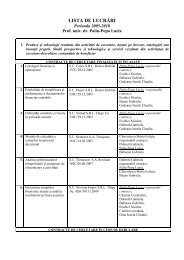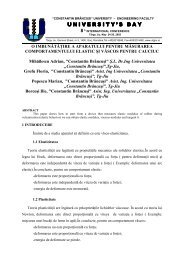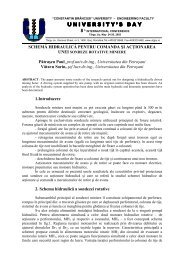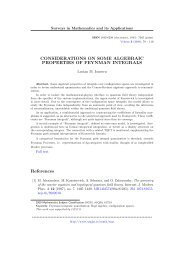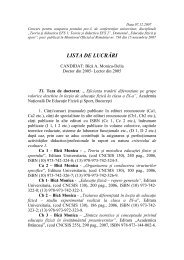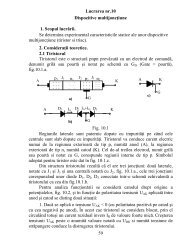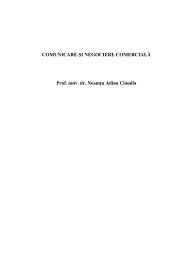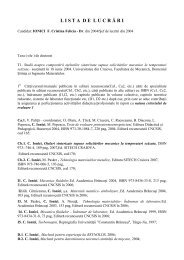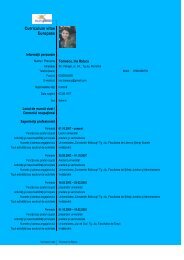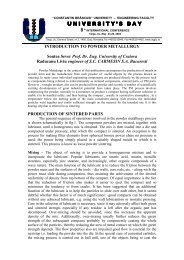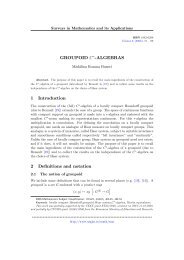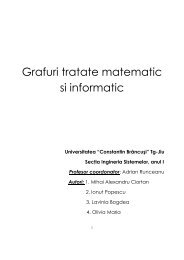NO. 2 / 2008 - Universitatea "Constantin BrâncuÅi"
NO. 2 / 2008 - Universitatea "Constantin BrâncuÅi"
NO. 2 / 2008 - Universitatea "Constantin BrâncuÅi"
You also want an ePaper? Increase the reach of your titles
YUMPU automatically turns print PDFs into web optimized ePapers that Google loves.
Analele Universităţii “<strong>Constantin</strong> Brâncuşi” din Târgu Jiu, Seria Litere şi Ştiinţe Sociale, Nr. 2/<strong>2008</strong>creativitatea a prezentului, atrasă de unangajament escatologic, o recreeazămoment cu moment.)În mod alternativ, putem speculaasupra dezvoltării ritmice a lumii ideilor înVest. Există evident câteva ritmuriconceptuale care încadrează istoricul ideilorşi Whitehead însuşi a insistat că vor veninoi epoci conceptuale. Contrastul binecunoscutdintre empirismul şi raţionalismuldualist (vezi de exemplu capitolul deînceput al Universului Pluralist al luiJames) este prea larg pentru a permitedezvoltarea unei imagini aplcabile încontextul prezentei noastre discuţii. Dacăluăm în considerare ultimele secole degândire umană, poate fi totuşi identificatăirmătoarea mişcare dialectică – afişând omutare a epicentrului din Italia în Germaniaşi apoi în lumea Anglo – Saxonă. (cea de-adoua fiind o entitate mult mai difuză dincauza hegemoniei culturale mondiale).Având în vedere că Renaşterea a lăudatperfecţiunea proporţiilor statice, arta şigândirea barocă, moştenitoare a contra-Reformei din 1630–1750, a pus accentul pemişcare, schimbare şi creştere. ReacţiaAufklärung a fost rapidă: secularizarea cucerinţele ei de raţionalitate, optimism şiprogres şi-a răspândit aripile dogmaticeasupra întregului peisaj social (să neamintim grand renfermement a luiFoucault). Cu Romantismul, accentul arevenit la sentimente, devenire şi opacitate(sau With Romanticism, the emphasisreturned to feeling, becoming and opacity(or inepuizabilitate), uneori chiariraţionalitate. Apoi pozitivisum lui A.Comte şi apoi al lui Wiener Kreis (careurma să fie curând trimis către SUA) aureprezentat o nouă Kehre, imediat contrabalansatăde primele publicaţii aleprocesului ale lui F. Nietzsche şi É.Boutroux, dar de asemenela ale lui C.S.Peirce, W. James şi A.N. Whitehead (să nuîl uităm pe cel înrudit lor din punct devedere conceptual: H. Bergson). Concluziaar putea fi: gânditorii procesului pot fioptimişti deaoarece modul lor de gândire nuexperience in the furrow of habit, thecreativity of the present, lured by someeschatological commitment, re-creates itmoment by moment.)Alternatively, we could speculate onthe rhythmic development of the world ofideas in the West. There are obviouslyconceptual rhythms that frame the historyof ideas and Whitehead himself would haveinsisted that there always will be novelconceptual epochs to come. The wellknowncontrast between pluralisticempiricism and dualistic rationalism (seefor instance the opening chapter of James’Pluralistic Universe) is a bit too broad toallow the development of an applicablepicture in the context of our presentdiscussion. If we consider the last centuriesof human thought, the following dialecticalmovement—displaying a shift of epicentrefrom Italy to Germany and later to theAnglo-Saxon world (the latter constituting afar more diffuse entity because of its worldwidecultural hegemony)—can benevertheless identified. Whereas theRenaissance lauded the perfection of staticproportions, Baroque art and thought, heirto the Counter-Reformation of 1630–1750,stressed movement, change and growth.The reaction of the Aufklärung was swift:secularization with its requirements ofrationality, optimism and progress spreadits dogmatic wings over the entire sociallandscape (remember Foucault’s grandrenfermement). With Romanticism, theemphasis returned to feeling, becoming andopacity (or inexhaustibleness), sometimeseven irrationality. Then the positivism of A.Comte and later of the Wiener Kreis (soonto be exported to the USA) constituted anew Kehre, promptly counter-balanced bythe first process publications of F.Nietzsche and É. Boutroux, but also of C.S.Peirce, W. James and A.N. Whitehead (notto forget their conceptual kin: H. Bergson).The conclusion could be: process thinkerscan be optimistic because their mode ofthought has not yet developed all itspotentialities or become generallyAnnals of the „<strong>Constantin</strong> Brâncuşi” University of Târgu Jiu, Series Letters and Social Sciences, No. 2/<strong>2008</strong>38



